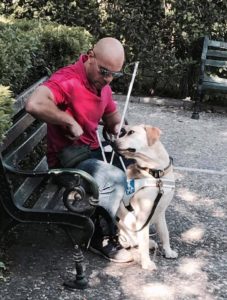 Certified service dog coach Alexandros Paraschis, CPDT-KA, CBCC-KA, has experience training guide dogs and other service dogs, as well as working with pets and their owners in Athens, Greece. He works for a nonprofit organization, Save a Greek Stray, and also offers education for dog trainers through his business, Greece Dog Friendly Academy.
Certified service dog coach Alexandros Paraschis, CPDT-KA, CBCC-KA, has experience training guide dogs and other service dogs, as well as working with pets and their owners in Athens, Greece. He works for a nonprofit organization, Save a Greek Stray, and also offers education for dog trainers through his business, Greece Dog Friendly Academy.
What made you decide you wanted to train service dogs?
I wanted to help people and animals in need. I was also fascinated by the bond that exists between the dog and their person, which in my experience is especially strong between service dogs and their handlers. I feel that service dogs understand that the work they are doing is important. My dream was always to find dogs in need of a home and care for and match them with a person who is in need of companionship and help.
Tell us about your work training guide dogs.
I specialized in guide dog training and for nearly three years I worked training guide dogs for a nonprofit organization here in Greece. I was the first dog trainer in Greece to use the clicker and only positive reinforcement methods for guide dogs and service dogs.
Things were pretty difficult when I first started, since guide dogs and service dogs were new here in Greece. The law did not give handlers with their guide dogs the right to access public transportation, restaurants or cafes. Even after that changed, for a long time I had to calmly explain the law whenever we worked with guide dogs in public access. Now the situation has changed, and people are informed and educated about the role of service dogs thanks to the efforts of Ioanna Maria Gertsou from Lara Guide Dogs and Zoi Geroulanou from Greek Guide Dogs.
Tell us about your current work.
I own Greece Dog Friendly Academy, a school for dog trainers. I provide education on positive dog training, including concepts that apply to service dog training, and prepare students working toward their CPDT-KA exam.
I also collaborate with the nonprofit Save a Greek Stray, which has an animal shelter that serves as a model for other shelters in Greece due to its high standards of animal care and welfare, and offers a number of programs. I help with programs like their prison program. We give inmates the skills to train shelter dogs, increasing the dogs’ chances for adoption and giving the prisoners the means to make a living from dog training as respected professionals after their release. One of our additional goals is to incorporate training service dogs in the prison program. We also run a therapy dog program for children with cancer.
As I am also a certified behavior consultant, I use my knowledge and expertise to help shelter dogs with behavior problems. We have many dogs in the shelter who have been abused in different ways and need tremendous work in order to feel safe again.
What motivated you to enroll in the SDC course?
I was thirsty for more knowledge; I wanted to learn more about service dogs and use this knowledge to teach the inmates to train service dogs. Together with the Save a Greek Stray organization we wanted to train rescue dogs to help people, and the SDC program was just what I needed.
What did you like the most about the SDC course?
Veronica was very helpful and supportive, and the course was straightforward, to the point and very informative. I consider myself lucky to have found this program.
What has surprised you about working with service dogs?
When I started working with service dogs, I had it in my mind that I would be working only with dogs, but that was far from the truth. I had to work more with the people than the dogs. I had to learn to be supportive, calm and patient. It was something that I could do easily with the dogs; I had all the patience in the world. But with people it was a different story. Service dog training made me a better person.
